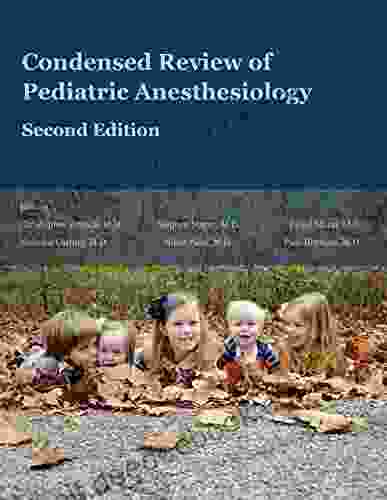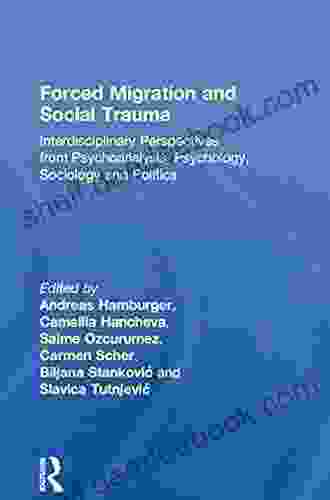Forced Migration and Social Trauma: Exploring the Psychological Impact of Displacement

Forced migration, driven by conflict, violence, persecution, or natural disasters, has become a prevalent global issue, affecting millions of individuals and communities worldwide.
4.8 out of 5
| Language | : | English |
| File size | : | 1922 KB |
| Text-to-Speech | : | Enabled |
| Enhanced typesetting | : | Enabled |
| Print length | : | 292 pages |
| Screen Reader | : | Supported |
Causes and Consequences of Forced Migration
The causes of forced migration are complex and multifaceted, often intertwined with political, economic, and environmental factors.
- Conflict and Violence: War, civil unrest, and ethnic clashes can lead to large-scale displacement as individuals flee persecution, violence, or threats to their safety.
- Natural Disasters: Earthquakes, floods, hurricanes, and other environmental catastrophes can displace communities, forcing them to seek refuge in new areas.
- Political Repression: Authoritarian regimes may employ forced displacement as a means of suppressing dissent or ethnic cleansing.
- Economic Factors: Poverty, unemployment, and lack of opportunities can drive individuals to migrate in search of better living conditions.
The consequences of forced migration are equally severe, affecting both displaced individuals and their host communities.
- Psychological Trauma: Displacement often involves witnessing or experiencing violence, separation from loved ones, and loss of home. These experiences can lead to severe psychological trauma, including depression, anxiety, and post-traumatic stress disorder (PTSD).
- Social Marginalization: Displaced populations may face discrimination, xenophobia, and social exclusion in their new environments, further compounding their psychological distress.
- Economic Hardship: Displaced individuals often lose their livelihoods and face economic challenges in their new homes, further exacerbating their vulnerabilities.
- Strain on Host Communities: Large-scale forced migration can put a strain on resources and services in host communities, leading to tensions and resentment.
Manifestations of Social Trauma
The social trauma experienced by displaced populations can manifest in a multitude of ways, affecting both individuals and communities.
- Mental Health Issues: As mentioned earlier, displaced populations are at an increased risk of developing mental health conditions, such as depression, anxiety, PTSD, and substance abuse.
- Interpersonal Conflicts: Forced displacement can disrupt social networks and family structures, leading to increased conflicts and difficulties in establishing new relationships.
- Cultural Dislocation: Displaced individuals may lose access to their cultural traditions, language, and way of life, which can contribute to a sense of loss and identity crisis.
- Social Isolation: Displaced populations may face barriers to integrating into their new communities, leading to isolation, loneliness, and a sense of alienation.
- Collective Trauma: In addition to individual trauma, forced migration can also lead to collective trauma experienced by entire communities. This shared trauma can impact generational identities and create a lasting legacy of distress.
Mitigating the Effects of Social Trauma: Interventions for Healing and Recovery
Recognizing the severe psychological impact of forced migration, it is essential to prioritize interventions aimed at mitigating the effects of social trauma and promoting healing and recovery.
- Trauma-Informed Care: Providing trauma-informed care involves understanding the specific needs of displaced populations and tailoring interventions accordingly. It includes creating safe and supportive environments, offering culturally-sensitive services, and promoting resilience.
- Mental Health Services: Access to mental health services, including therapy, counseling, and medication, can be crucial in addressing the psychological distress experienced by displaced populations.
- Community Support: Establishing community support networks, such as support groups, mentorship programs, and peer support networks, can foster a sense of belonging and provide a platform for sharing experiences and coping mechanisms.
- Educational Opportunities: Education and job training can provide displaced individuals with skills and resources to rebuild their lives and contribute to their new communities.
- Cultural Preservation: Preserving and promoting cultural traditions can help displaced populations maintain a sense of identity and continuity amidst the upheaval they have experienced.
: Solidarity and Advocacy for Displaced Populations
Forced migration and its associated social trauma are pressing global issues that demand attention and action. Understanding the psychological impact of displacement is essential for developing effective interventions and policies that promote healing, recovery, and resilience among displaced populations.
Empathy, solidarity, and advocacy are crucial in supporting displaced populations and advocating for their rights. It is our collective responsibility to create inclusive and supportive environments that foster the well-being and integration of displaced individuals and communities.
4.8 out of 5
| Language | : | English |
| File size | : | 1922 KB |
| Text-to-Speech | : | Enabled |
| Enhanced typesetting | : | Enabled |
| Print length | : | 292 pages |
| Screen Reader | : | Supported |
Do you want to contribute by writing guest posts on this blog?
Please contact us and send us a resume of previous articles that you have written.
 Book
Book Novel
Novel Chapter
Chapter Text
Text Story
Story Genre
Genre Library
Library Paperback
Paperback E-book
E-book Paragraph
Paragraph Shelf
Shelf Glossary
Glossary Bibliography
Bibliography Foreword
Foreword Preface
Preface Synopsis
Synopsis Annotation
Annotation Footnote
Footnote Manuscript
Manuscript Scroll
Scroll Tome
Tome Classics
Classics Library card
Library card Biography
Biography Autobiography
Autobiography Reference
Reference Encyclopedia
Encyclopedia Dictionary
Dictionary Thesaurus
Thesaurus Card Catalog
Card Catalog Borrowing
Borrowing Archives
Archives Academic
Academic Reading Room
Reading Room Interlibrary
Interlibrary Storytelling
Storytelling Awards
Awards Reading List
Reading List Book Club
Book Club Textbooks
Textbooks Mark Cosdon
Mark Cosdon Dominic Mann
Dominic Mann Mary A Osborne
Mary A Osborne Kei Hiruta
Kei Hiruta John D Lyons
John D Lyons Craig Barton
Craig Barton Cristiano Nogueira
Cristiano Nogueira David Galula
David Galula David Snider
David Snider Joshua Cohen
Joshua Cohen Michael Hamburg
Michael Hamburg J K Winn
J K Winn Francis X Shen
Francis X Shen Jeffrey Ullom
Jeffrey Ullom Patricia M Cunningham
Patricia M Cunningham L Dean Webb
L Dean Webb Brian Salter
Brian Salter Austin Jersild
Austin Jersild Camille Blachowicz
Camille Blachowicz Samuel Taylor Coleridge
Samuel Taylor Coleridge
Light bulbAdvertise smarter! Our strategic ad space ensures maximum exposure. Reserve your spot today!

 Floyd PowellHannah Arendt and Isaiah Berlin: Exploring the Depths of Human Existence and...
Floyd PowellHannah Arendt and Isaiah Berlin: Exploring the Depths of Human Existence and...
 Earl WilliamsHow to Write a Newsletter That Grows Your Business, Makes More Sales, and...
Earl WilliamsHow to Write a Newsletter That Grows Your Business, Makes More Sales, and... Ian MitchellFollow ·5.5k
Ian MitchellFollow ·5.5k Kazuo IshiguroFollow ·9.6k
Kazuo IshiguroFollow ·9.6k Bryan GrayFollow ·5k
Bryan GrayFollow ·5k Miguel de CervantesFollow ·3.8k
Miguel de CervantesFollow ·3.8k Jacques BellFollow ·16.4k
Jacques BellFollow ·16.4k Jeremy CookFollow ·5.3k
Jeremy CookFollow ·5.3k Eli BlairFollow ·18.6k
Eli BlairFollow ·18.6k Banana YoshimotoFollow ·10.3k
Banana YoshimotoFollow ·10.3k

 Beau Carter
Beau CarterLater Political Writings: A Window into the Evolution of...
Political thought, like...

 Tyrone Powell
Tyrone PowellThe Essential Guide to Family School Partnerships:...
: The Importance of...

 Christian Barnes
Christian BarnesAdvancing Folkloristics: Conversations with Jesse...
Dr. Jesse Fivecoate is an...

 Jake Carter
Jake CarterHal Leonard DJ Method Connell Barrett: A Comprehensive...
Are you ready...

 John Updike
John UpdikeCondensed Review of Pediatric Anesthesiology Second...
Condensed Review of...

 Guillermo Blair
Guillermo BlairExploring the Complexities of Motherhood and Identity: A...
Elena Ferrante's "The Lost...
4.8 out of 5
| Language | : | English |
| File size | : | 1922 KB |
| Text-to-Speech | : | Enabled |
| Enhanced typesetting | : | Enabled |
| Print length | : | 292 pages |
| Screen Reader | : | Supported |








